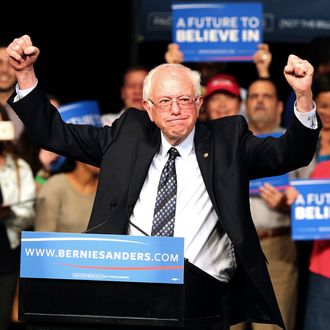
Harry Enten of FiveThirtyEight spoke for the entire punditocracy late Tuesday night when he called Bernie Sanders’s Michigan primary win “one of the greatest upsets in modern political history.” That was particularly true for FiveThirtyEight itself, which had rated Hillary Clinton’s odds of winning Michigan at 99 percent. But the data geeks there were hardly alone. RealClearPolitics’ average of recent polls of Michigan had Clinton up 21 points; you have to go back to September in RCP’s database to find a survey in which Clinton’s lead was less than double digits.
So what happened? It remains unclear. The explanations you often hear for a polling failure aren’t necessarily available. A lot of talking heads last night confidently asserted that Sunday’s candidate debate in Flint turned everything around, too late for most pollsters to catch. But the one poll we cannot ignore (other than the balloting itself), the exit poll of actual voters, showed Clinton, not Sanders, leading among late deciders, and Sanders leading among those who made up their minds over a week before the primary. Surprising ebbs and flows in turnout sometimes wrong-foot pollsters, too, but it’s hard to evaluate turnout in a place like Michigan, where the last Democratic presidential primary in 2008 was held under a cloud of national party sanctions for violating calendar rules, which kept the eventual nominee, Barack Obama, off the ballot. Turnout was a lot higher this year, but still significantly lower than Republican turnout. Speaking of Republicans, there’s an anecdotal theory floating around that some Clinton supporters, imagining their candidate to be safely in the winner’s circle, crossed over to vote against Donald Trump in the GOP contest, taking advantage of Michigan’s “open” primary system. But the GOP exit poll shows only 7 percent of voters as self-indentified Democrats, not a particularly high number.
Looking at other factors, the one that jumps off the page in the exit polls is that voters under 30 — the absolute core of Sanders’s support, as evidenced by the fact he took 81 percent of it — constituted 21 percent of the primary electorate, a point more than the over-65 voters that Clinton won by better than two-to-one. The 21 percent is unusually high; under-30 voters were only 15 percent of the primary electorate in the other Democratic vote yesterday, in Mississippi. And Sanders’s youth turnout almost certainly contributed to his other big and surprising number in Michigan, the 31 percent of African-Americans he won. Sanders won the white non-college-educated vote by a robust 58-41 margin, which might support the idea that white working-class folk turned against Clinton over her past support of trade agreements, and/or (to cite another election-night rumor) because UAW activists were angered at her misrepresentation of Sanders’s position on the auto-industry bailout. But that’s not a shocking margin for Sanders; he won that category of voters by 63-28 in one of his Super Tuesday states, Oklahoma. And again: Why didn’t the polls pick this up?
Perhaps the truth will slowly emerge as the number of people staring at the results proliferates today. But there are two important things we know for sure. First of all, this polling failure will cast a long shadow over surveys in future contests, which will be longer the less we understand what happened. Who can trust any polling lead? Should we be particularly suspicious of the polling lead Clinton currently enjoys in the midwestern primaries coming up next Tuesday (in Illinois, Missouri, and Ohio)?
Without the polling failure, it might have been surprising that Sanders beat Clinton in a place like Michigan, but it’s hardly shocking: We’re talking about a state with a Democratic primary electorate that’s been taught for years that economic globalization is a terrible, job-destroying thing; where African-Americans represent a smaller percentage than in the Deep South states Clinton has been winning so handily; and that has several large universities where presumably the Bern has burned as brightly as elsewhere. Add in the open-primary factor, and it’s hardly a bad target for Sanders. But because no one expected it (including the winning candidate, who left the state before the returns came in), the upset drew attention away from Clinton’s huge landslide win in Mississippi and the fact that she earned more delegates overall on March 8. If Sanders somehow turns it all around and wins the nomination — still a very long shot — his acceptance speech in Philadelphia should begin with a heartfelt thanks to the polling industry.






























